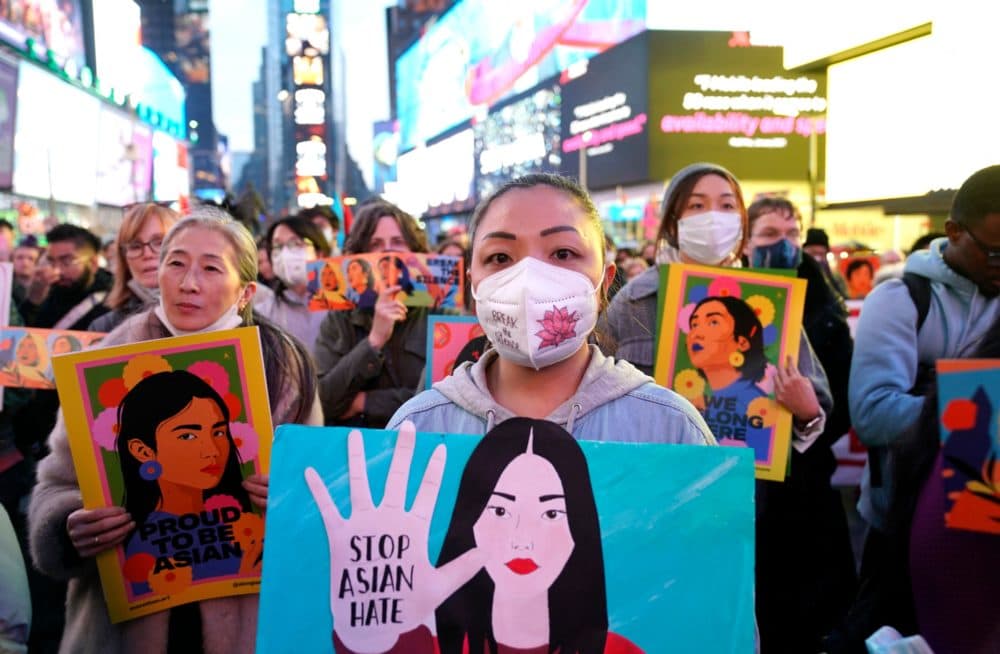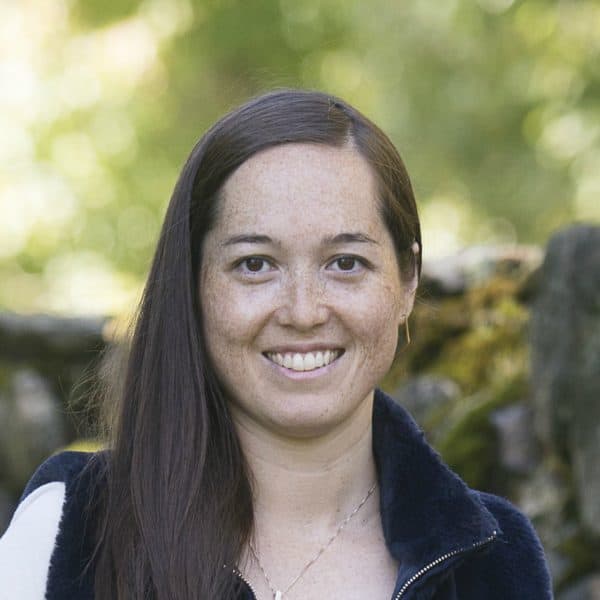Advertisement
Commentary
I felt kinship with the women killed in Atlanta. And distance

I got a bikini wax last week — my first in several years. It’s not a regular indulgence for me, rather something I do maybe once a year, when I know I’ll be spending a lot of time in a bathing suit. On this occasion, I was preparing for a spring break trip to Los Angeles with my eldest daughter. It was to be our first plane ride since the pandemic began.
What I didn’t realize when I booked the appointment, is that I’d scheduled it on the one year anniversary of the shootings at three Atlanta spas, in which eight people were killed, including six Asian women. That night, I was on another trip with my eldest, who slept as I poured over headlines. I couldn’t sleep as the wind whipped off the pond just outside our Airbnb in Cape Cod. The next morning, I texted friends who I knew were also waking up to heaviness. I was raw, fumbling to articulate my thoughts.
I went on long beach walks, letting the late winter wind off the Atlantic whip my hair into a frenzy.
***
As I lay down under a small towel, staring up at the blue ceiling awaiting the esthetician, I thought about the people who died: Hyun Jung Grant, Xiaojie Tan, Suncha Kim, Soon Chung Park, Yong Ae Yue, Daoyou Feng, Delaina Ashley Yaun, and Paul Andre Michels. Their last moments in rooms like this one.
I felt distant from these women — born into my middle-class American life to a Japanese immigrant mother and white American father, my financial safety net growing with age and marriage. But there was also a sensation of kinship. I too have borne the expectation to be submissive, have been exoticized, oversexualized, pursued because I satisfy a “fetish” as a woman of East Asian heritage. The tension between the two — distance and kinship — is never far from my mind.
I help organizations and companies engage with issues of equity and inclusion. My workshops begin with identity and intersectionality. Coined by legal scholar and critical race theorist Kimberlé Crenshaw, and rooted in Black feminism, intersectionality is a prism through which to view overlapping inequities, and how they compound for certain people.
Intersectionality immediately came to mind as I read the words of Jennifer Wu, an attorney who represents the families of two Asian women who’ve been attacked in New York City since the 2021 shootings in Atlanta: Hoa Nguyen, punched in the face in January 2022, survived; and GuiYing Ma, assaulted with a rock in November 2021, did not. Wu said:
The way the law has treated hate crimes is to force people to choose one reason why the hate crime is committed. The law is not structured in a way that acknowledges the reality that the reason we love and hate people is for a multitude of reasons and not a single exclusive reason.
The law is not written to see those who are marginalized in their wholeness. The racism and misogyny that come together in acts of violence against Asian women are flattened when we don’t acknowledge their intersectional identities. This erasure, including legal systems that are not set up with the necessary nuance that Crenshaw and others illuminate, is a further brutality. In the case of the Atlanta victims, the perception that spa workers are sex workers adds another layer. Their murders cannot simply be subsumed into a broader “anti-Asian hate.”
***
As the list of Asians being assaulted and murdered grows, there is only so much grainy security camera footage I can take in. There are days I have to numb myself to the what-ifs just to get out of bed. I wonder, especially with my KN95 mask on, how people perceive my race. I worry for my mother, riding the New York City subway, navigating her way across Manhattan. On a recent visit to my parents’ apartment, I noticed that my dad accompanied my mom on errands she once would have done alone. I didn’t ask why.
When Michelle Go was murdered 10 months after the Atlanta shootings, I couldn’t sleep. She’d been pushed in front of an NYC subway train, and I couldn’t help but think about my teenage self and how, even then, I always made sure to stand close to the steel beams scattered throughout many stations. I never turned the music in my Walkman up too high, forever on alert. Long before the mass shooting in Atlanta, I have looked over my shoulder in parking lots, on sidewalks, entering vestibules. Christina Yuna Lee’s stabbing is a reminder that safety, when felt, is temporary.
On a recent visit to my parents’ apartment, I noticed that my dad accompanied my mom on errands she once would have done alone. I didn’t ask why.
And of course, I know the fear I’m experiencing now is a status quo others have experienced for centuries. It is another reminder and indication of my privilege. President Trump and his administration normalized the anti-Asian rhetoric that has always existed, fanning its flames into a veritable wildfire. As the violence continues, the silence of so many — public figures and friends alike — is notable. No matter how many workshops I lead on Anti-Asian racism and AAPI activism, it can feel like I’m screaming into a void.
***
I reread the text thread with my friends from the morning after the Atlanta shootings. The messages detailed the physical manifestations — headache, gritted teeth — of their reactions. We collectively shook heads at the media coverage, which centered on the shooter’s feelings and questioned whether his actions were racially motivated. I remember in the days that followed, how we validated each other’s confusion, fear and anger. We turned to writers like R.O. Kwon, who were able to write so swiftly.
Today, I still struggle to find the words. I self-edit, feeling I am not “Asian enough” to be writing this. The impostor syndrome I have carried my entire life, is another layer, complicating my anxiety and fear. Intellectually, I know this is a manifestation of internalized racism, that white supremacy benefits when I silence myself. Yet I can’t shake the gnawing feeling that I lack the credentials to carry this pain. But carry it I do: Every day as I pack my daughters’ lunch, ask my husband how his day is going, and Zoom into meetings where March 16 didn’t mark anything to others beyond numbers on a calendar.
Back on the table at the spa, the smears of hot wax did their job, extracting each hair at the root. The esthetician asked me about my daughters and then she told me about her own. As she worked with precision, I allowed myself to be distracted by each moment of acute pain. How the same hands that ripped in one moment, soothed in the next.
